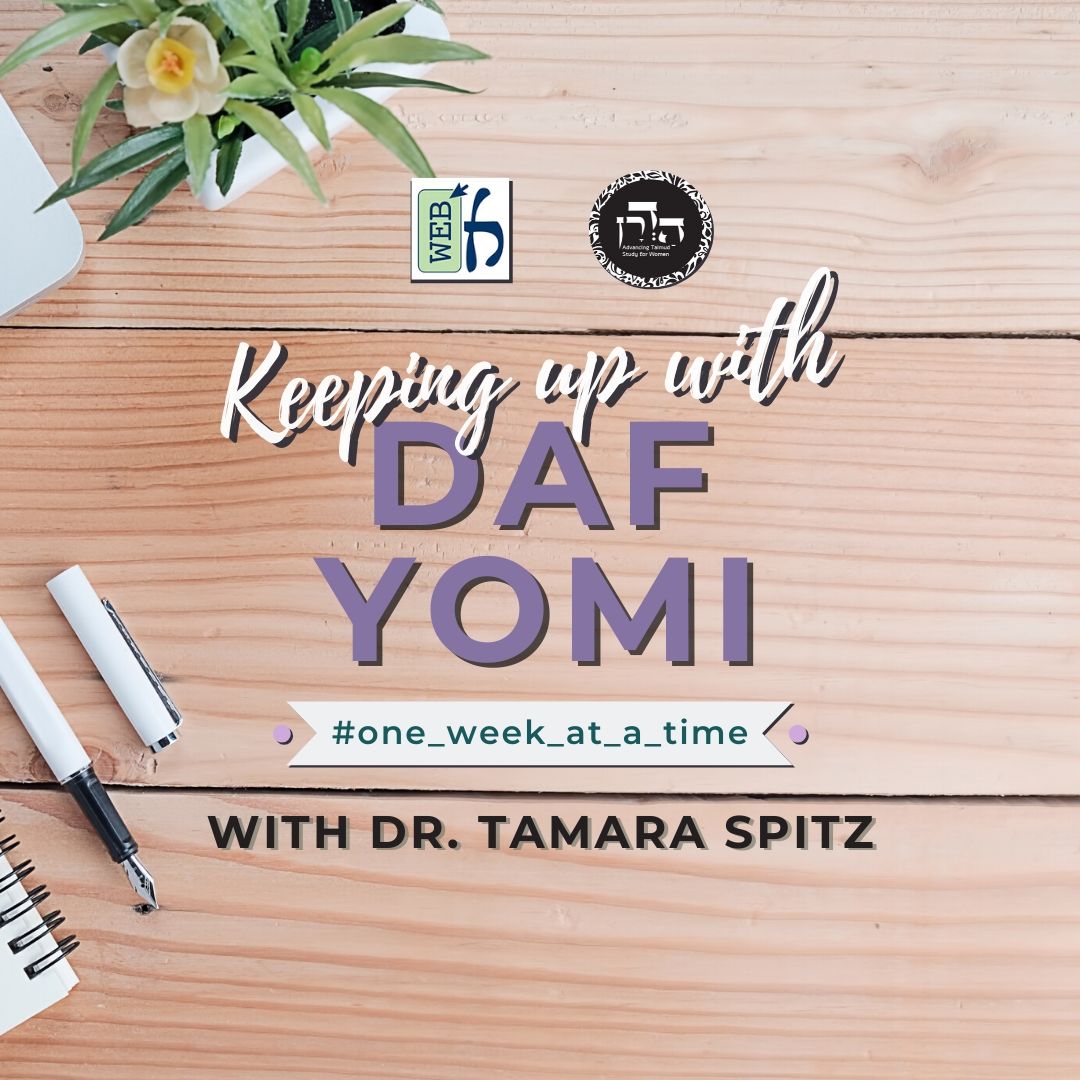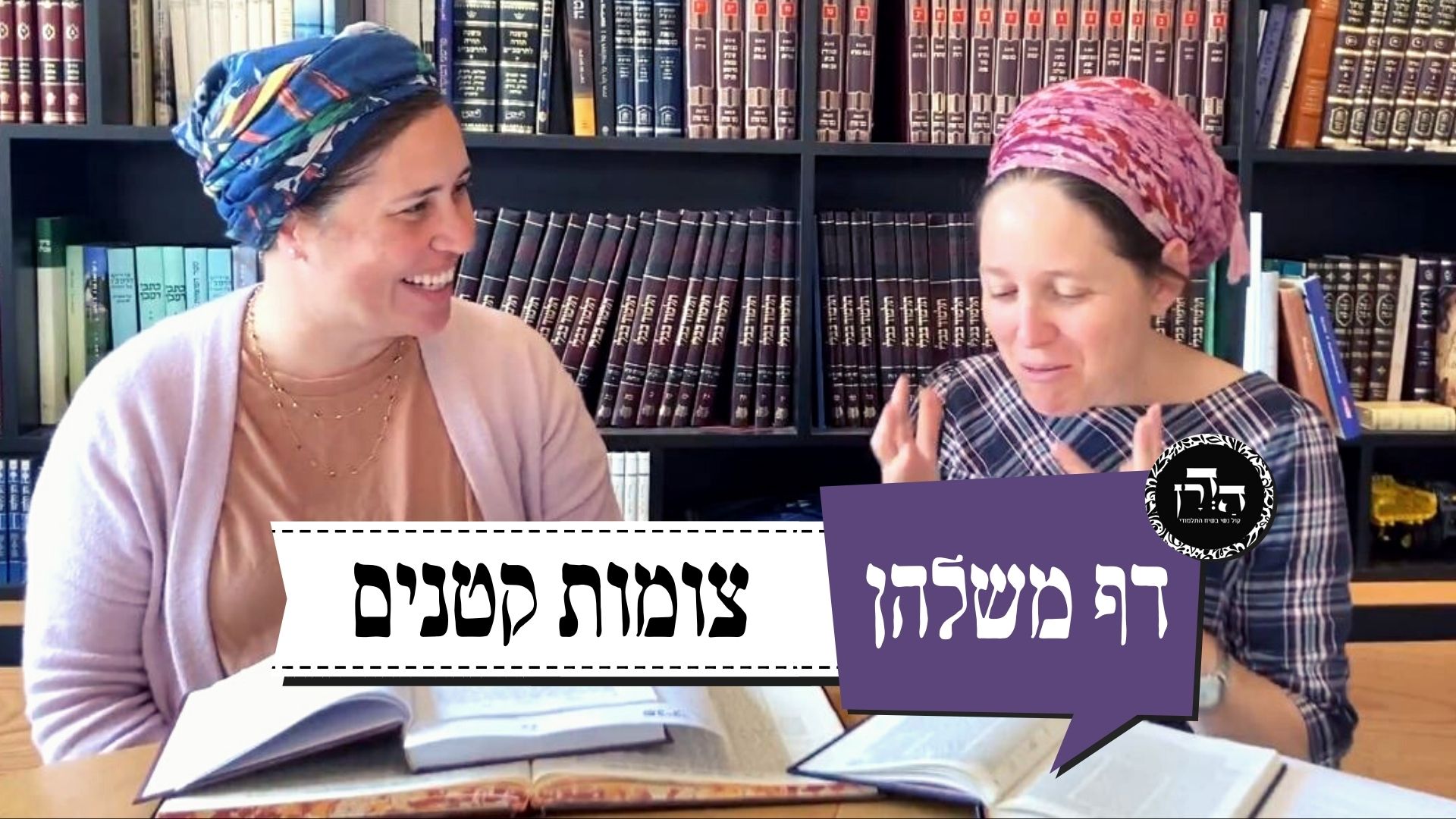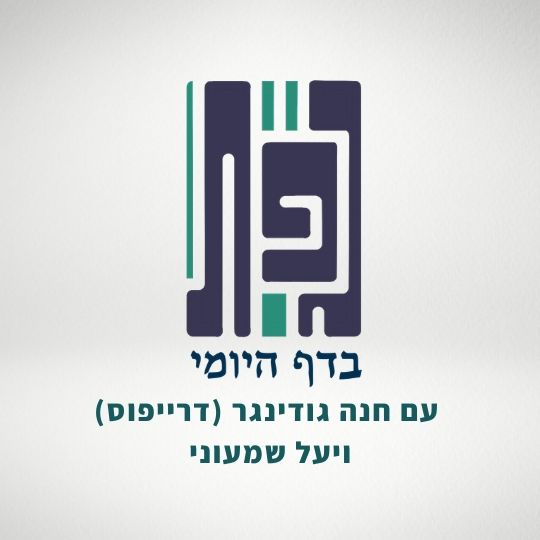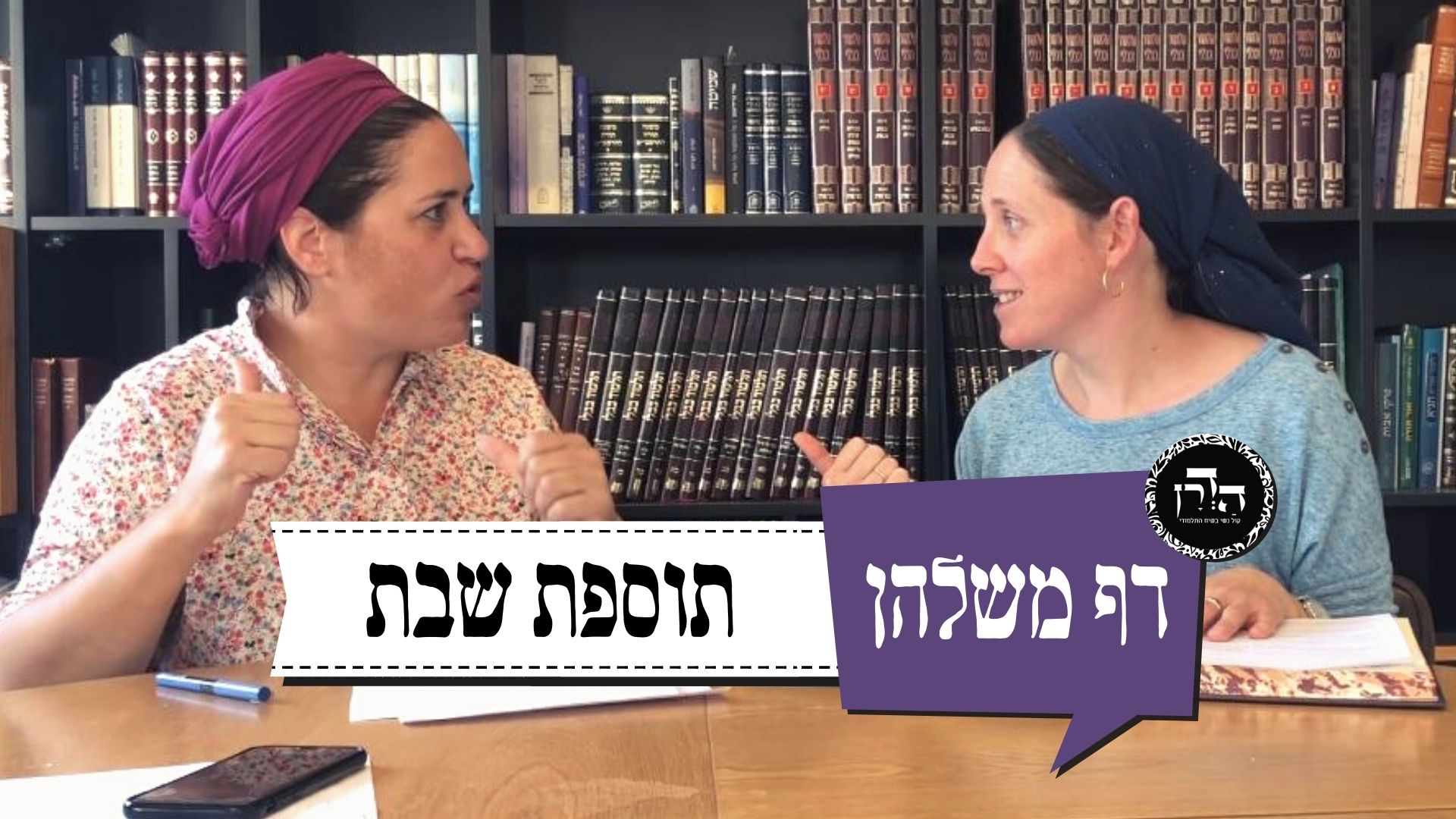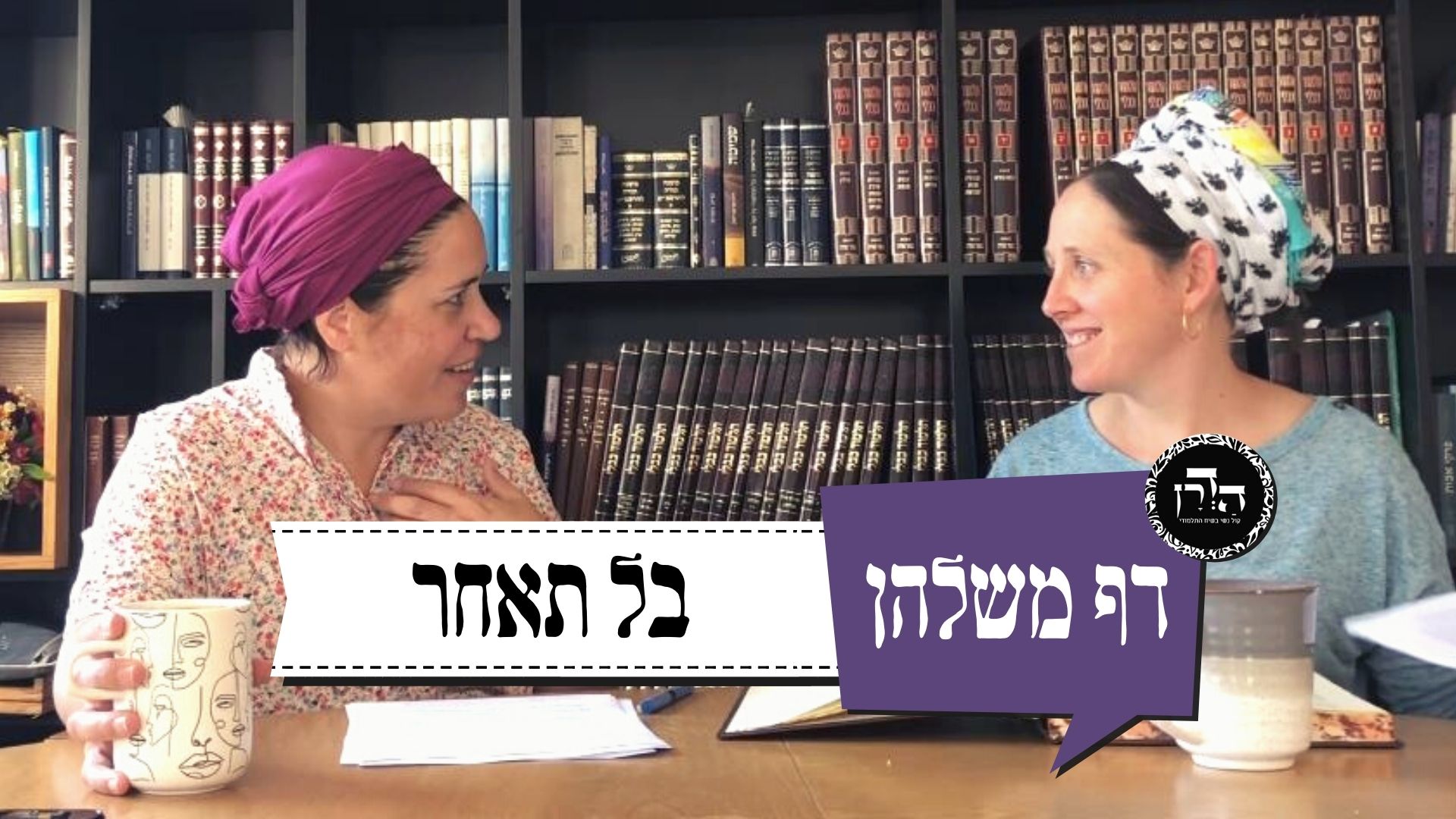ראש השנה לג
וְאֵין חוֹתְכִין אוֹתוֹ, בֵּין בְּדָבָר שֶׁהוּא מִשּׁוּם שְׁבוּת וּבֵין בְּדָבָר שֶׁהוּא מִשּׁוּם לֹא תַעֲשֶׂה. מִשּׁוּם שְׁבוּת — מַגָּלָא. לֹא תַעֲשֶׂה — סַכִּינָא.
§ The mishna stated: One may not cut the shofar if it needs to be prepared, neither with an object that is prohibited due to a rabbinic decree nor with an object that may not be used due to a Torah prohibition. The Gemara explains: An example of an object prohibited due to a rabbinic decree is a sickle, which is not ordinarily used for preparing a shofar; an example of an object that may not be used due to a prohibition by Torah law is a knife.
הַשְׁתָּא מִשּׁוּם שְׁבוּת אָמְרַתְּ לָא — לֹא תַעֲשֶׂה מִיבַּעְיָא? זוֹ וְאֵין צָרִיךְ לוֹמַר זוֹ קָתָנֵי.
The Gemara asks: Now that you have said that to sound the shofar one may not perform an action that is prohibited due to rabbinic law, is it necessary to say that one may not perform an action that violates a prohibition by Torah law? The Gemara answers: The mishna teaches employing the style: This, and it is unnecessary to say that.
אֲבָל אִם רָצָה לִיתֵּן לְתוֹכוֹ מַיִם אוֹ יַיִן — יִתֵּן. מַיִם אוֹ יַיִן — אֵין, מֵי רַגְלַיִם — לָא.
§ The mishna continues. However, if one wishes to place water or wine into the shofar on Rosh HaShana, so that it should emit a clear sound, he may place it. The Gemara infers: Water or wine, yes, one may insert these substances into a shofar. However, urine, whose acidity is good for the shofar, no.
מַתְנִיתִין מַנִּי — אַבָּא שָׁאוּל הִיא. דְּתַנְיָא, אַבָּא שָׁאוּל אוֹמֵר: מַיִם אוֹ יַיִן — מוּתָּר, כְּדֵי לְצַחְצְחוֹ. מֵי רַגְלַיִם — אָסוּר, מִפְּנֵי הַכָּבוֹד.
The Gemara asks: Who is the tanna of the mishna? The Gemara answers: It is Abba Shaul, as it is taught in a baraita that Abba Shaul says: With regard to water or wine, one is permitted to pour these liquids into a shofar on Rosh HaShana in order to make its sound clear. However, with regard to urine, one is prohibited to do so due to the respect that must be shown to the shofar. Although urine is beneficial, it is disrespectful to place it in a shofar, which serves for a mitzva.
אֵין מְעַכְּבִין אֶת הַתִּינוֹקוֹת מִלִּתְקוֹעַ. הָא נָשִׁים — מְעַכְּבִין, וְהָתַנְיָא: אֵין מְעַכְּבִין לֹא אֶת הַנָּשִׁים וְלֹא אֶת הַתִּינוֹקוֹת מִלִּתְקוֹעַ בְּיוֹם טוֹב! אֲמַר אַבָּיֵי, לָא קַשְׁיָא: הָא רַבִּי יְהוּדָה, הָא רַבִּי יוֹסֵי וְרַבִּי שִׁמְעוֹן.
§ The mishna further teaches: One need not prevent children from sounding the shofar on Rosh HaShana. The Gemara infers: If women wish to sound the shofar, one indeed prevents them from doing so. The Gemara asks: Isn’t it taught in a baraita that one does not prevent women or children from sounding the shofar on a Festival? The Gemara answers that Abaye said: This is not difficult: This mishna is in accordance with the opinion of Rabbi Yehuda, while that baraita is in accordance with the opinion of Rabbi Yosei and Rabbi Shimon.
דְּתַנְיָא: ״דַּבֵּר אֶל בְּנֵי יִשְׂרָאֵל״. בְּנֵי יִשְׂרָאֵל סוֹמְכִין, וְאֵין בְּנוֹת יִשְׂרָאֵל סוֹמְכוֹת, דִּבְרֵי רַבִּי יְהוּדָה. רַבִּי יוֹסֵי וְרַבִּי שִׁמְעוֹן אוֹמְרִים: נָשִׁים סוֹמְכוֹת — רְשׁוּת.
As it is taught in a baraita: “Speak to the children of Israel…and he shall place his hands upon the head of the burnt-offering” (Leviticus 1:2–4). The phrase “children of Israel” literally means sons of Israel, and this teaches that the sons of Israel place their hands upon offerings, but the daughters of Israel do not place their hands upon offerings; this is the statement of Rabbi Yehuda. Rabbi Yosei and Rabbi Shimon say: It is optional for women to place their hands on the head of an offering before it is slaughtered, although they are not obligated to do so. Apparently, according to the opinion of Rabbi Yosei and Rabbi Shimon, if a woman wishes to perform any mitzva that is not obligatory for her, she is permitted to do so. Here too, one does not prevent a woman from sounding the shofar.
אֲבָל מִתְעַסְּקִין בָּהֶם עַד שֶׁיִּלְמְדוּ. אָמַר רַבִּי אֶלְעָזָר: אֲפִילּוּ בְּשַׁבָּת. תַּנְיָא נָמֵי הָכִי: מִתְעַסְּקִין בָּהֶן עַד שֶׁיִּלְמְדוּ, אֲפִילּוּ בְּשַׁבָּת. וְאֵין מְעַכְּבִין הַתִּינוֹקוֹת מִלִּתְקוֹעַ בְּשַׁבָּת, וְאֵין צָרִיךְ לוֹמַר בְּיוֹם טוֹב.
§ The mishna further states: Rather, one occupies himself with them, encouraging and instructing children, until they learn how to sound it properly. Rabbi Elazar said: This applies even when Rosh HaShana occurs on Shabbat. This is also taught in a baraita: One occupies himself with children until they learn to sound the shofar properly, even on Shabbat. And one does not prevent the children from sounding the shofar on Shabbat, and needless to say one does not prevent them on the festival of Rosh HaShana that occurs on a weekday.
הָא גוּפָא קַשְׁיָא, אָמְרַתְּ: מִתְעַסְּקִין בָּהֶן עַד שֶׁיִּלְמְדוּ, וַאֲפִילּוּ בְּשַׁבָּת — אַלְמָא לְכַתְּחִלָּה אָמְרִינַן תִּקְעוּ. וַהֲדַר תָּנָא: אֵין מְעַכְּבִין — עִכּוּבָא הוּא דְּלָא מְעַכְּבִין, הָא לְכַתְּחִלָּה לָא אָמְרִינַן תִּקְעוּ!
The Gemara asks: This matter itself is difficult, i.e., there is an internal contradiction in the baraita. You said that one occupies himself with the children until they learn how to sound the shofar, and this applies even on Shabbat. Apparently, we say to them ab initio: Sound the shofar. And then the baraita taught: One does not prevent them from sounding the shofar, which indicates that although one does not prevent them from sounding it, we do not say ab initio: Sound it.
לָא קַשְׁיָא: כָּאן
The Gemara explains: This is not difficult. Here,
בְּקָטָן שֶׁהִגִּיעַ לְחִינּוּךְ, כָּאן בְּקָטָן שֶׁלֹּא הִגִּיעַ לְחִינּוּךְ.
in the first clause, the baraita is dealing with a minor who has reached the age of training in mitzvot. This child is taught to sound the shofar, as one is obligated to teach him the proper way to perform mitzvot. However, here, in the second clause, the baraita is dealing with a minor who has not yet reached the age of training. Although one need not prevent this child from sounding the shofar, one does not encourage him to do so.
וְהַמִּתְעַסֵּק לֹא יָצָא. הָא תּוֹקֵעַ לָשִׁיר — יָצָא. לֵימָא מְסַיַּיע לֵיהּ לְרָבָא, דְּאָמַר רָבָא: הַתּוֹקֵעַ לָשִׁיר — יָצָא. דִּלְמָא תּוֹקֵעַ לָשִׁיר — נָמֵי מִתְעַסֵּק קָרֵי לֵיהּ.
§ The mishna taught: One who acts unawares while sounding the shofar, without any intention to produce a sound, has not fulfilled his obligation. The Gemara infers: One who sounds a shofar for music, even if he has no intention to perform the mitzva, has fulfilled his obligation. The Gemara asks: Let us say that the mishna supports the opinion of Rava, as Rava said: One who sounds a shofar for music has fulfilled his obligation. The Gemara rejects this suggestion. There is no clear proof from here, as perhaps one who sounds a shofar for music is also called one who acts unawares. It is possible that the tanna of the mishna includes in this category anyone who sounds the shofar without a clear intention to fulfill the mitzva.
וְהַשּׁוֹמֵעַ מִן הַמִּתְעַסֵּק — לֹא יָצָא. אֲבָל הַשּׁוֹמֵעַ מִן הַמַּשְׁמִיעַ לְעַצְמוֹ, מַאי? יָצָא. לֵימָא תֶּיהְוֵי תְּיוּבְתֵּיהּ דְּרַבִּי זֵירָא, דְּאָמַר לֵיהּ רַבִּי זֵירָא לְשַׁמָּעֵיהּ: אִיכַּוַּון וּתְקַע לִי!
§ The mishna continues. And one who hears the shofar blasts from one who acts unawares has not fulfilled his obligation. The Gemara asks: However, one who hears the shofar blasts from one who is sounding the shofar for himself, without intention of sounding it for others, what is the halakha? The mishna apparently indicates that he has fulfilled his obligation. Let us say that this is a conclusive refutation of the opinion of Rabbi Zeira, as Rabbi Zeira said to his attendant: Have the intention to sound the shofar on my behalf and sound it for me. This statement indicates that one must have the intention to enable the one who hears it to fulfill his obligation.
דִּלְמָא אַיְּידֵי דִּתְנָא רֵישָׁא מִתְעַסֵּק, תְּנָא סֵיפָא נָמֵי מִתְעַסֵּק.
The Gemara rejects this argument. Perhaps one can explain that since the first clause of the mishna taught the halakha with regard to one who acts unawares, the latter clause also taught the halakha with regard to one who acts unawares. If so, no inference may be drawn from here to the case of one who sounds the shofar for himself, with no intention of doing so for others.
מַתְנִי׳ סֵדֶר תְּקִיעוֹת: שָׁלֹשׁ שֶׁל שָׁלֹשׁ שָׁלֹשׁ. שִׁיעוּר תְּקִיעָה כְּשָׁלֹשׁ תְּרוּעוֹת, שִׁיעוּר תְּרוּעָה כְּשָׁלֹשׁ יְבָבוֹת. תָּקַע בָּרִאשׁוֹנָה וּמָשַׁךְ בַּשְּׁנִיָּה כִּשְׁתַּיִם — אֵין בְּיָדוֹ אֶלָּא אַחַת.
MISHNA: The order of the blasts is three sets of three blasts each, which are: Tekia, terua, and tekia. The length of a tekia is equal to the length of three teruot, and the length of a terua is equal to the length of three whimpers. If one sounded the first tekia of the initial series of tekia, terua, tekia, and then extended the second tekia of that series to the length of two tekiot, so that it should count as both the second tekia of the first set and the first tekia of the second set, he has in his hand the fulfillment of only one tekia, and he must begin the second set with a new tekia.
מִי שֶׁבֵּירַךְ וְאַחַר כָּךְ נִתְמַנָּה לוֹ שׁוֹפָר — תּוֹקֵעַ וּמֵרִיעַ וְתוֹקֵעַ שָׁלֹשׁ פְּעָמִים.
With regard to one who recited the blessings of the additional prayer, and only afterward a shofar became available to him, he sounds a tekia, sounds a terua, and sounds a tekia, an order he repeats three times.
כְּשֵׁם שֶׁשְּׁלִיחַ צִבּוּר חַיָּיב, כָּךְ כׇּל יָחִיד וְיָחִיד חַיָּיב. רַבָּן גַּמְלִיאֵל אוֹמֵר: שְׁלִיחַ צִבּוּר מוֹצִיא אֶת הָרַבִּים יְדֵי חוֹבָתָן.
Just as the prayer leader is obligated in the prayer of Rosh HaShana, so too, each and every individual is obligated in these prayers. Rabban Gamliel disagrees and says: Individuals are not obligated, as the prayer leader fulfills the obligation on behalf of the many.
גְּמָ׳ וְהָתַנְיָא: שִׁיעוּר תְּקִיעָה כִּתְרוּעָה! אָמַר אַבָּיֵי: תַּנָּא דִּידַן קָא חָשֵׁיב תְּקִיעָה דְּכוּלְּהוּ בָּבֵי וּתְרוּעוֹת דְּכוּלְּהוּ בָּבֵי. תַּנָּא בָּרָא קָא חָשֵׁיב חַד בָּבָא וְתוּ לָא.
GEMARA: The Gemara raises a difficulty. Although the mishna taught that the length of a tekia is equal to the length of three teruot, isn’t it taught in a baraita that the length of a single tekia is equal to the length of an entire terua, which is comprised of several shorter sounds? Abaye said: There is no difficulty. The tanna of our mishna counts the tekia of all the sets of blasts and the teruot of all the sets. He means that the length of the three tekiot is equal to the length of the three teruot. Conversely, the tanna of the baraita counts the first tekia of only one set, and no more, and therefore he simply states that the length of one tekia is equal to the length of one terua.
שִׁיעוּר תְּרוּעָה כִּשְׁלֹשׁ יְבָבוֹת. וְהָתַנְיָא: שִׁיעוּר תְּרוּעָה כִּשְׁלֹשָׁה שְׁבָרִים!
§ The mishna continues. The length of a terua is equal to the length of three whimpers. The Gemara asks: Isn’t it taught in a baraita that the length of a terua is equal to the length of three shevarim, i.e., broken blasts, which presumably are longer than whimpers?
אָמַר אַבָּיֵי: בְּהָא וַדַּאי פְּלִיגִי, דִּכְתִיב: ״יוֹם תְּרוּעָה יִהְיֶה לָכֶם״, וּמְתַרְגְּמִינַן: ״יוֹם יַבָּבָא יְהֵא לְכוֹן״. וּכְתִיב בְּאִימֵּיהּ דְּסִיסְרָא: ״בְּעַד הַחַלּוֹן נִשְׁקְפָה וַתְּיַבֵּב אֵם סִיסְרָא״. מָר סָבַר גַּנּוֹחֵי גַּנַּח. וּמָר סָבַר יַלּוֹלֵי יַלֵּיל.
Abaye said: In this matter, the tanna’im certainly disagree. Although the first baraita can be reconciled with the mishna, this second baraita clearly reflects a dispute. As it is written: “It is a day of sounding [terua] the shofar to you” (Numbers 29:1), and we translate this verse in Aramaic as: It is a day of yevava to you. And to define a yevava, the Gemara quotes a verse that is written about the mother of Sisera: “Through the window she looked forth and wailed [vateyabev], the mother of Sisera” (Judges 5:28). One Sage, the tanna of the baraita, holds that this means moanings, broken sighs, as in the blasts called shevarim. And one Sage, the tanna of the mishna, holds that it means whimpers, as in the short blasts called teruot.
תָּנוּ רַבָּנַן: מִנַּיִן שֶׁבְּשׁוֹפָר? תַּלְמוּד לוֹמַר: ״וְהַעֲבַרְתָּ שׁוֹפַר תְּרוּעָה״.
§ The Sages taught in a baraita: From where is it derived that the soundings of Rosh HaShana must be performed with a shofar? The verse states: “Then you shall make proclamation with the blast of the shofar on the tenth day of the seventh month; on the Day of Atonement you shall make proclamation with the shofar throughout all your land” (Leviticus 25:9).
אֵין לִי אֶלָּא בַּיּוֹבֵל, בְּרֹאשׁ הַשָּׁנָה מִנַּיִן? תַּלְמוּד לוֹמַר: ״בַּחֹדֶשׁ הַשְּׁבִיעִי״, שֶׁאֵין תַּלְמוּד לוֹמַר ״בַּחֹדֶשׁ הַשְּׁבִיעִי״, וּמָה תַּלְמוּד לוֹמַר ״בַּחֹדֶשׁ הַשְּׁבִיעִי״ — שֶׁיִּהְיוּ כׇּל תְּרוּעוֹת שֶׁל חֹדֶשׁ שְׁבִיעִי זֶה כָּזֶה.
From this I have derived the halakha only with regard to Yom Kippur of the Jubilee Year. From where do I derive that the soundings of Rosh HaShana must also be with a shofar? The verse states: “Of the seventh month.” Since there is no need for the verse to state: “Of the seventh month,” as it already states: “On the Day of Atonement,” what is the meaning when the verse states: “Of the seventh month”? This comes to teach that all the obligatory soundings of the seventh month must be similar to one another.
וּמִנַּיִן שֶׁפְּשׁוּטָה לְפָנֶיהָ — תַּלְמוּד לוֹמַר: ״וְהַעֲבַרְתָּ שׁוֹפַר תְּרוּעָה״. וּמִנַּיִן שֶׁפְּשׁוּטָה לְאַחֲרֶיהָ — תַּלְמוּד לוֹמַר: ״תַּעֲבִירוּ שׁוֹפָר״.
This verse states: “The blast [terua] of the shofar,” indicating that one must sound a terua. The Gemara asks: And from where is it derived that the terua sound is preceded by a straight blast, i.e., a tekia? The verse states: “Then you shall make proclamation with the blast of the shofar [shofar terua]” (Leviticus 25:9), indicating that the terua must be preceded by the basic sound of a shofar, i.e., by the straight blast of a tekia. And from where is it derived that the terua sound is followed by a straight blast? The same verse states again: “You shall make proclamation with the shofar,” which indicates that there must be another tekia after the terua.
וְאֵין לִי אֶלָּא בַּיּוֹבֵל, בְּרֹאשׁ הַשָּׁנָה מִנַּיִן? תַּלְמוּד לוֹמַר: ״בַּחֹדֶשׁ הַשְּׁבִיעִי״.
The baraita continues. From this I have derived the halakha only that these tekia blasts before and after the terua must be sounded on Yom Kippur of the Jubilee Year. From where do I derive that they must be sounded on Rosh HaShana as well? The verse states: “Of the seventh month.”



